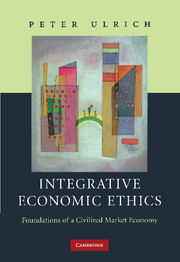Book contents
- Frontmatter
- Contents
- List of figures
- Preface
- Translator's note
- Introduction: orientation in economic-ethical thinking
- Part I Fundamental concepts of modern ethics and the approach of integrative economic ethics
- Part II Reflections on the foundations of economic ethics I: a critique of economism
- Part III Reflections on the foundations of economic ethics II: rational economic activity and the lifeworld
- Part IV A topology of economic ethics: the ‘sites’ of morality in economic life
- Bibliography
- Index of subjects
- Index of names
Part III - Reflections on the foundations of economic ethics II: rational economic activity and the lifeworld
Published online by Cambridge University Press: 22 September 2009
- Frontmatter
- Contents
- List of figures
- Preface
- Translator's note
- Introduction: orientation in economic-ethical thinking
- Part I Fundamental concepts of modern ethics and the approach of integrative economic ethics
- Part II Reflections on the foundations of economic ethics I: a critique of economism
- Part III Reflections on the foundations of economic ethics II: rational economic activity and the lifeworld
- Part IV A topology of economic ethics: the ‘sites’ of morality in economic life
- Bibliography
- Index of subjects
- Index of names
Summary
There is an economy, because there are human persons.
Economic activity means the creation of value. As is the case with all the technical terms of modern economics, the customary understanding of this widely used concept in business administration and (political) economics is now restricted to systemic functional relationships. Accordingly we are dealing with a purely quantitative factor, namely a monetarily evaluated net economic performance, i.e. value added, achieved in the market by means of work or service offered in return for payment, which effectively remains to a corporation, a branch or an entire national economy (in exchange with other national economies) after the deduction of costs which are also determined by the market. But the calculatory concept betrays its original ethical-qualitative meaning in the human life-context: the question of the value of economic activity in regard to the quality of life. In the final phase of the pre-modern (and that means here pre-systemic) cameralistic economy the relationship of economic activity to life values was still a matter of course. In 1835, for example, the ‘Kameralistische Encyclopädie’ offers the following definition:
The contribution of goods to the achievement of the aims of man depends in fact on their suitability. The degree of suitability of a good for human ends is its value, which rises and falls in comparison with other goods and the importance of the end.
- Type
- Chapter
- Information
- Integrative Economic EthicsFoundations of a Civilized Market Economy, pp. 185 - 188Publisher: Cambridge University PressPrint publication year: 2008

